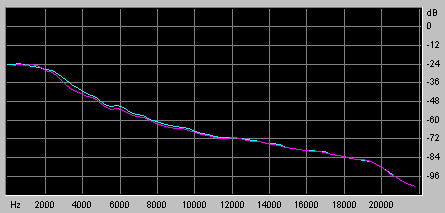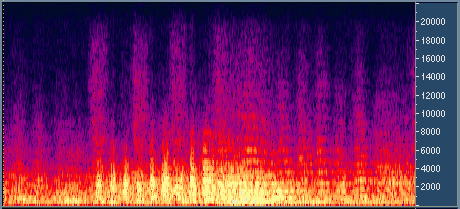The test file was encoded with Yamaha's TwinVQ encoder
and decoded using JAEP's plugin for WinAmp. This plugin is an interface
to NTT's decoder and code book and so gives the same audio quality
as using Yamaha's player but you can save the output as a wave file.

NTT TwinVQ HQ 96kb/s Frequency Response

NTT TwinVQ HQ 96kb/s Spectral View
When we look at the frequency response of a 96kb/s
VQF file encoded at high quality we see that the output extends
right up to 22kHz. The frequency response above 12kHz is suppressed
a bit when compared to the source material. It is this suppression
of higher frequencies I believe that leads to the slight loss of
treble detail as compared to the original.
When we look at the the spectral view of the VQF file
we see an amazing correlation to the spectral view of the source
material. There is some suppression of material above 20kHz and
almost no degradation below 20kHz. This is really superb considering
that the file is two thirds the size of a 128kb/s MP3 file.
Listening tests reveal no noticeable encoding artifacts.
This holds for source material that produces noticeable artifacts
in 128kb/s MP3 encoding such as the Local Hero live recording I
mentioned earlier. In some recordings the VQF file tends to lack
some presence when compared to the source material. Even with headphones
you can hear that the VQF file does not have as good stereo
imaging as an MP3 files for complex material.
I personally would almost always choose a 96kb/s VQF
file over a 128kb/s MP3 file. This is because I am far more tolerant
of reduction in stereo imaging in a recording than encoding artifacts.
In most instances I would say 96kb/s VQF files are not as good as
160kb/s MP3 files. This is definitely true for the source material
reviewed here.
CPU utilization on my system for playback is an acceptable
35%. The major drawback of VQF encoding is that it is very slow.
I feel that TwinVQ is definitely an alternative to
MP3 for mainstream usage especially in portable applications like
Walkman type players. I would not be surprised to see "music
on a chip-card" type players from Yamaha in the near future.
I hope to see NTT or Yamaha release a 128kb/s version
of their codec soon as this should eliminate the shortcomings of
96kb/s files.
[Back] [Next]

